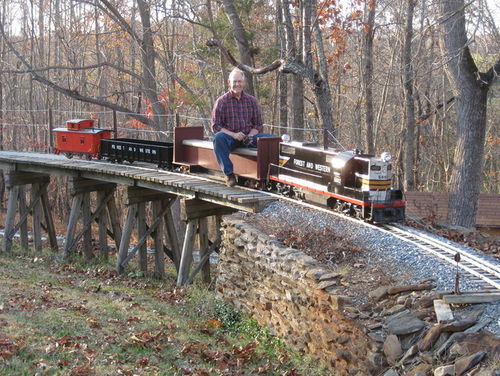Chris Schieck
Jump to navigation
Jump to search
Chris Schieck posted the following video on YouTube.com, Feb 26, 2023
- In 1968 and 1969, I was beginning to build a live steam locomotive and cars. In those days, ready-to-run locomotives and cars were not readily as they are today. Almost all locomotives and cars were constructed by their owners. They either made or purchased castings, machined them, and fabricated the other parts. I visited other live steamers whenever I could to learn how they built the things they did and in some cases to enjoy running them. Many long-lasting friendships were developed in the process, and it continues today. This video is made from 8mm home movies (sorry, no sound) and showcases some early live steamers' efforts. Constructing a live steam locomotive is typically a long term activity, but the satisfaction of having and operating a machine built "from the ground up" is most satisfying.
Koster's First GP-7
Chris Schieck wrote, May 2014:

Chris Schieck's latest motive power addition is Bill Koster's first GP-7, built in 1970. It received new motors and control system in the Forest & Western shops during 2011. This is the most powerful engine on the Forest & Western RR.
- I looked over the IBLS website and saw a piece on Bill Koster and his first GP-7 in 1970. I own and operate that same engine (I replaced its motors and controls). That first GP-7 had no doors or louvers on the long hood as his later Geeps did. I joined the BLS back in the Carl Purinton days.
- I contacted Bill Koster regarding mechanical and electrical details of the engine after I had purchased it from an estate in Indiana. I later corresponded and spoke with him at a steam meet in Florida. Bill told a story of how the engine was damaged during his visit to the west coast, repaired and sold while he was still in Oregon. It wound up spending most of its life out west (thus the SP black widow paint scheme) before being sold to a fellow in Indianapolis who ran it on tracks in Michigan and probably elsewhere. I believe the damage occurred at the PNWLS Shady Dell track near Portland, OR. Bill's story was particularly interesting, as I had been an associate member of the PNWLS the late 1970s and 1980s. Several pleasant sessions were spent with PNWLS president Harry Harvey and others in the club during my several business trips to Oregon and Washington. Small world! Great hobby!